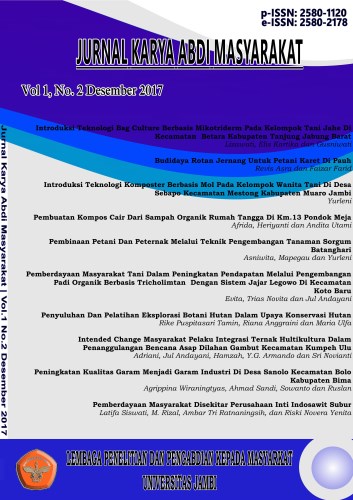PENINGKATAN KUALITAS GARAM MENJADI GARAM INDUSTRI DI DESA SANOLO KECAMATAN BOLO KABUPATEN BIMA
DOI:
https://doi.org/10.22437/jkam.v1i2.4292Abstract
Tujuan pokok pelaksanaan KKN-PPM di Desa Sanolo Kecamatan Bolo Kabupaten Bima adalah peningkatan kualitas garam rakyat menjadi garam industri. Garam rakyat di Desa Sanolo saat sudah menggunakan teknologi geomembran, namun perlu ditingkatkan kualitasnya menjadi garam industri baik untuk industri pangan maupun industri non pangan. Kualitas garam utamanya ditentukan oleh kandungan NaCl serta pengotornya seperti kalsium, magnesium, sulfat, barium dan besi. Pelaksanaan KKN-PPM ini diperoleh produk berupa garam beryodium dan garam kualitas industri. Metode yang digunakan dalam peningkatan kualitas garam yaitu dengan menggunakan metode rekristalisasi. Untuk meningkatkan partisipasi kelompok sasaran akan diberikan pelatihan proses produksi. Adapun langkah-langkah operasional yang dilakukan meliputi analisis bahan baku, proses pencucian garam, proses rekristalisasi dan analisis produk. Berdasarkan hasil kegiatan KKN-PPM yang sudah terlaksana mengindikasikan bahwa masyarakat Desa Sanolo sangat membutuhkan adanya pengetahuan baru dan penerapan teknologi serta pemberdayaan masyarakat. Hal ini dibuktikan dengan peran serta dan partisipasi masyarakat dalam setiap pelaksanaan kegiatan yang telah direncanakan. Berbagai program yang telah dilaksanakan berjalan dengan baik yang meliputi berbagai aspek diantaranya peningkatan kualitas dan nilai tambah produk petani garam, penerapan teknologi tepat guna, penyuluhan pertanian dan partisipasi dalam pendidikan.
Downloads
Downloads
Published
Versions
- 2017-12-15 (1)
- 2017-12-15 (1)
How to Cite
Issue
Section
License
Please find the rights and licenses in Jurnal Jurnal Karya Abdi Masyarakat (JKAM).
- License
The non-commercial use of the article will be governed by the Creative Commons Attribution license as currently displayed on Creative Commons Attribution 4.0 International License.
- Authors Warranties
The author warrants that the article is original, written by stated author(s), has not been published before, contains no unlawful statements, does not infringe the rights of others, is subject to copyright that is vested exclusively in the author and free of any third party rights, and that any necessary written permissions to quote from other sources have been obtained by the author(s).
- User Rights
JKAM's spirit is to disseminate articles published are as free as possible. Under the Creative Commons license, JKAM permits users to copy, distribute, display, and perform the work for non-commercial purposes only. Users will also need to attribute authors and JKAM on distributing works in the journal.
- Rights of Authors
Authors retain the following rights:
- Copyright, and other proprietary rights relating to the article, such as patent rights,
- The right to use the substance of the article in future own works, including lectures and books,
- The right to reproduce the article for own purposes, provided the copies are not offered for sale,
- The right to self-archive the article.
- Co-Authorship
If the article was jointly prepared by other authors, the signatory of this form warrants that he/she has been authorized by all co-authors to sign this agreement on their behalf, and agrees to inform his/her co-authors of the terms of this agreement.
- Termination
This agreement can be terminated by the author or JKAM upon two months notice where the other party has materially breached this agreement and failed to remedy such breach within a month of being given the terminating party notice requesting such breach to be remedied. No breach or violation of this agreement will cause this agreement or any license granted in it to terminate automatically or affect the definition of JKAM.
- Royalties
This agreement entitles the author to no royalties or other fees. To such extent as legally permissible, the author waives his or her right to collect royalties relative to the article in respect of any use of the article by JKAM or its sublicensee.
- Miscellaneous
JKAM will publish the article (or have it published) in the journal if the articles editorial process is successfully completed and JKAM or its sublicensee has become obligated to have the article published. JKAM may conform the article to a style of punctuation, spelling, capitalization, referencing and usage that it deems appropriate. The author acknowledges that the article may be published so that it will be publicly accessible and such access will be free of charge for the readers.








